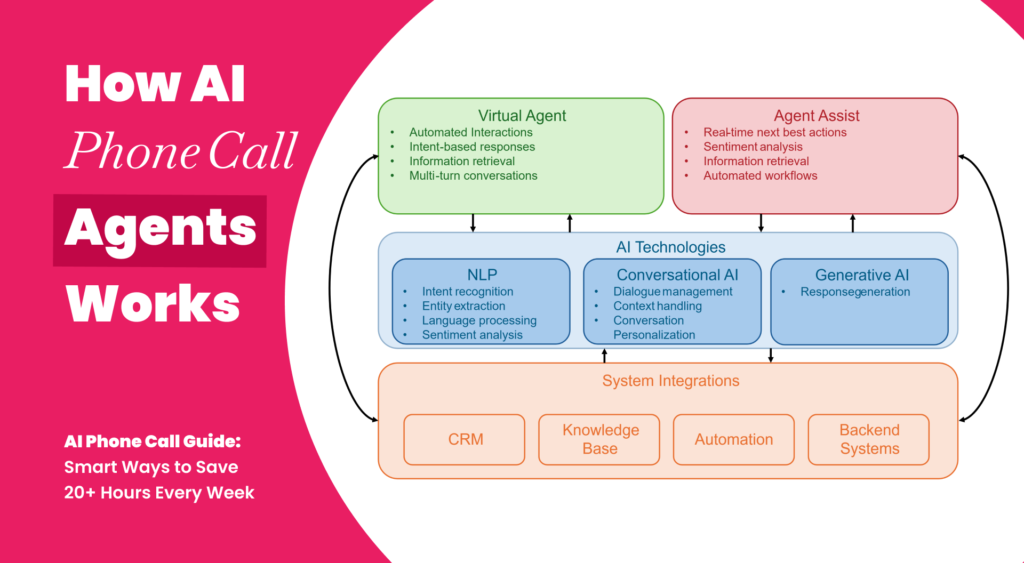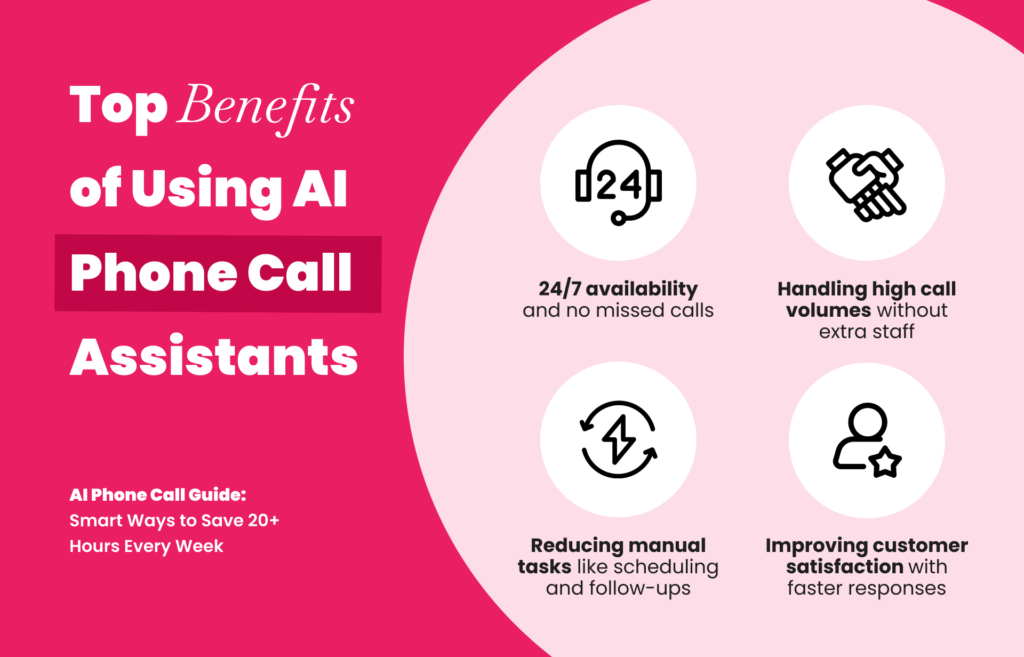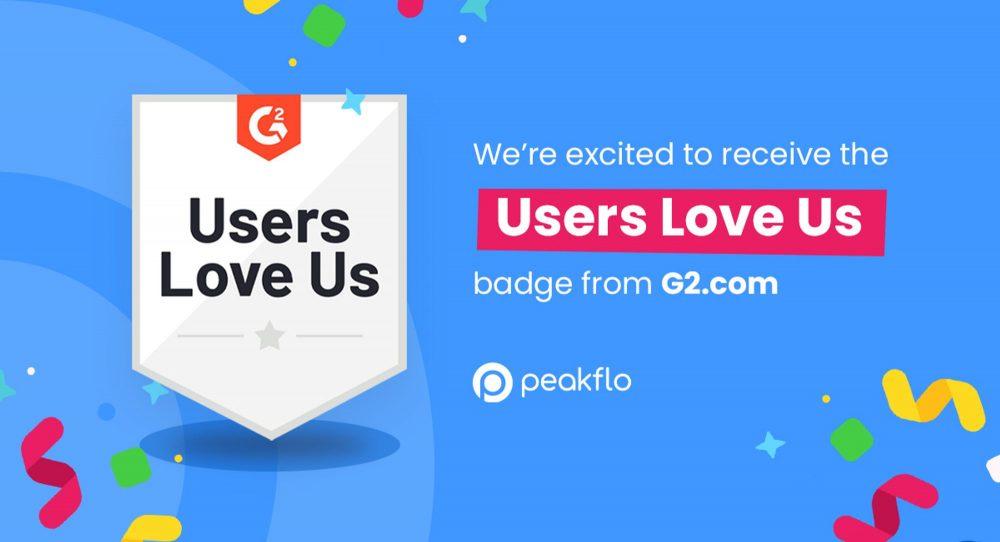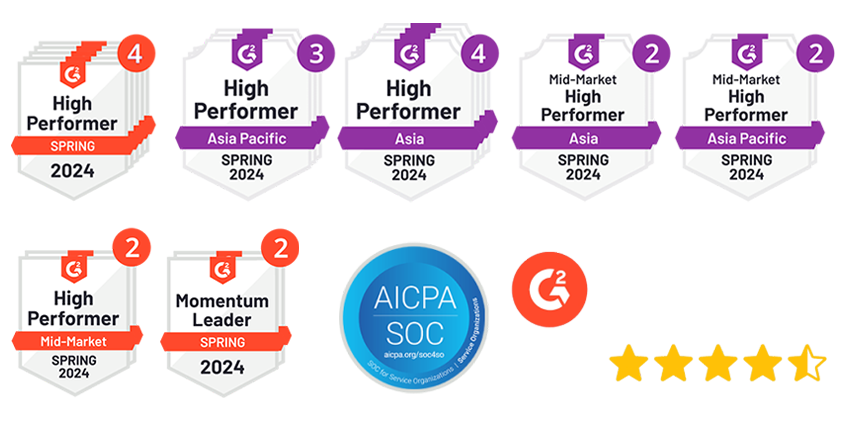Phone calls consume massive amounts of business time, yet most companies still handle them manually. Customer service teams spend hours on routine inquiries, appointment scheduling, and basic information requests that could be automated. This manual approach creates bottlenecks, especially during peak periods when call volumes surge beyond staff capacity. AI phone calls are changing how businesses handle customer interactions.
Gartner predicts that 85% of customer service leaders will explore or pilot customer-facing conversational GenAI solutions by 2025. The technology is advancing rapidly, as agentic AI is on track to resolve 80% of common service issues without human intervention by 2029, cutting operational costs by 30% in the process.
The business case for AI phone call assistants has become compelling. Recent reductions in AI model pricing (some up to 87%) have dramatically lowered the cost of call automation. Additionally, 69% of consumers now prefer using AI-powered self-service tools for fast issue resolution. This shift explains why 80% of companies are already using AI to improve customer experience, with the AI customer service sector projected to reach $4.1 billion by 2027.
Phone automation can save your business 20+ hours every week through systematic handling of routine tasks, round-the-clock availability, and direct integration with your existing systems. Whether you need to reduce staff workload, improve customer satisfaction, or scale operations without increasing headcount, AI phone solutions offer practical approaches to streamline business communication.
How AI Phone Call Agents Work

Image Source: Burnie Group
AI phone call technology has evolved far beyond the rigid menu systems most businesses still use. Traditional Interactive Voice Response (IVR) systems force callers through button-pressing sequences that frustrate customers and waste time. Modern AI phone agents engage in natural conversations, understanding what callers need and responding appropriately.
What are AI Phone Call Assistants?
AI phone call assistants are virtual agents that handle customer interactions through voice channels. These systems differ from older technology that relied on predefined decision trees. Today’s AI assistants use advanced algorithms to interpret natural language and respond appropriately.
The technology combines three core components:
- Voice Recognition: Converts spoken words into text that machines can process
- Natural Language Processing (NLP): Analyzes the context and intent behind words
- Data Integration: Connects to business systems like CRMs for personalized interactions
Voice assistant adoption continues growing rapidly, with users in the US expected to reach 157.1 million by 2026, compared to 142 million in 2022. Global projections show 8.4 billion voice assistant units by 2024.
How Voice Agents Process Calls in Real Time
When someone calls a number connected to an AI assistant, several processes happen simultaneously:
The caller’s audio gets captured and streamed to the AI system. Speech recognition converts this audio into text, often while the person is still speaking. Natural language understanding algorithms then analyze this text to determine the caller’s intent.
The system processes this information through either predefined logic flows or AI models trained for specific scenarios like appointment scheduling or query resolution. Based on this analysis, it generates an appropriate response.
Text-to-speech technology converts this response into natural-sounding audio delivered back to the caller. This entire process happens with minimal latency—often under one second—creating a seamless conversation.
For technical implementation, the architecture typically involves establishing a connection that allows for streaming audio inputs and outputs directly, significantly reducing latency. This persistent connection enables the fluid back-and-forth that makes modern AI calls feel natural.
Large Language Models and Phone Systems
The breakthrough in AI phone technology comes from integrating Large Language Models (LLMs) with telephony systems. LLMs like GPT-4 and Claude have expanded what’s possible in voice interactions.
A complete AI phone call system includes several components:
- Telephony APIs: Services like Twilio, Telnyx provide the infrastructure for handling incoming and outgoing calls
- Speech Recognition: Converts audio to text for processing
- Large Language Models: Process the conversation context and generate appropriate responses
- Text-to-Speech: Converts text responses back to spoken words
When implemented correctly, these systems maintain conversation context throughout interactions, allowing for natural dialog flow. Advanced implementations even incorporate sentiment analysis to detect emotional states like frustration or satisfaction in a caller’s voice, enabling the system to adapt its tone accordingly.
Modern LLMs can understand nuanced instructions and context, including humor and subtle contextual cues. As a result, interactions feel less robotic and more human-like, improving customer experience while handling high call volumes efficiently.
Top Benefits of Using AI Phone Call Assistants

AI phone call assistants solve common business communication problems that drain time and resources. These systems address specific pain points while delivering measurable improvements to your operations.
24/7 availability and no missed calls
Most businesses lose potential customers simply because no one answers the phone. Research shows that 60% of customers prefer calling local businesses after finding them online, yet only 38% of these calls are answered, with 80% of callers refusing to leave voicemails. This represents a significant loss of potential business.
AI phone call assistants provide round-the-clock service, ensuring you never miss another opportunity, regardless of when customers reach out. These virtual receptionists handle inquiries during weekends, holidays, and after-hours—times when traditional staffing would be cost-prohibitive or impractical.
Handling high call volumes without extra staff
Call volume spikes can overwhelm your team, leading to frustrated customers and lost business. AI phone call agents manage thousands of simultaneous calls without requiring additional personnel. These systems can reduce call wait times by 40% and lower abandonment rates by 60%, which keeps more customers engaged.
Advanced platforms achieve impressive 68% automated resolution rates during peak periods. Some implementations have demonstrated the ability to cut staffing requirements by up to 90% through automation of repetitive tasks. This capability allows businesses to scale their phone operations efficiently without proportional increases in labor costs.
Reducing manual tasks like scheduling and follow-ups
Staff time gets consumed by routine but essential responsibilities. AI assistants excel at handling these tasks automatically. These systems can check appointment availability in real-time, send automatic reminders to reduce no-shows, and allow customers to reschedule using natural voice commands.
Beyond scheduling, AI phone call systems streamline follow-up processes through automated surveys and feedback collection, freeing your team from these time-intensive tasks. The technology also handles data entry and call logging automatically, giving your staff more time to address complex customer needs.
Improving customer satisfaction with faster responses
Response speed directly impacts customer satisfaction. AI phone call assistants deliver remarkable improvements in service quality. Some implementations have cut average hold times by an astounding 99%.
This efficiency translates directly to customer satisfaction, with sentiment-aware AI systems boosting satisfaction rates by up to 25%. Studies further indicate a 10% reduction in average call length and 17% fewer abandoned calls when AI systems are deployed, contributing to satisfaction increases of up to 30%. Additionally, by analyzing customer behavior patterns, these systems can offer personalized recommendations and detect early signs of dissatisfaction for timely intervention.
AI phone call technology provides businesses with operational efficiencies and customer experience improvements that were simply unattainable with traditional phone systems alone.
8 Smart Ways to Save 20+ Hours Every Week
Managing phone operations manually creates unnecessary work that drains your team’s productivity. Here are eight strategies to reclaim 20+ hours weekly through targeted automation:
1. Automate appointment scheduling
Medical scheduling AI can forecast patient demand, prioritize high-need cases, and optimize appointment slots automatically. Healthcare professionals are discovering that AI scheduling reduces no-shows by up to 30% while improving reminder efficiency by 40%. This technology allows patients to find providers, filter by attributes, and book appointments without human intervention.
The system handles the entire booking process – checking availability, confirming appointments, and sending reminders. Patients can reschedule or cancel using natural voice commands, eliminating the back-and-forth calls that typically consume staff time.
2. Use AI for lead qualification and follow-ups
AI-powered SDRs qualify leads by asking key questions about budget, timeline, and needs through email or chat. These systems can analyze real-time intent signals, score leads based on responses, and automatically book meetings with qualified prospects. Furthermore, AI lead qualification tools help businesses expand market reach while maintaining a consistent pipeline, specifically targeting prospects who match your ideal customer profile.
The technology identifies high-intent prospects and nurtures them through personalized follow-up sequences, ensuring no qualified lead falls through the cracks.
3. Handle after-hours and weekend calls
Notably, 27% of leads call outside normal business hours. AI receptionists ensure these opportunities aren’t lost by providing 24/7 availability, processing inquiries instantly, and scheduling appointments when customers are ready to buy. This capability transforms your after-hours answering service, coupled with human backup for complex situations.
Rather than losing potential customers to voicemail, your AI assistant captures their information and intent, scheduling callbacks during business hours or routing urgent matters appropriately.
4. Automate order status and delivery updates
Order status AI agents monitor and provide real-time updates on customer orders, essentially eliminating manual tracking work. These systems automatically capture, organize, and sync orders from storefronts to spreadsheets or dashboards without manual data entry. Simultaneously, they send timely notifications about critical order changes, improving transparency throughout the fulfillment process.
Customers can check their order status anytime without calling your support team, while you maintain complete visibility into the fulfillment pipeline.
5. Use batch calling for outreach campaigns
Batch calling enables businesses to dispatch thousands of personalized calls simultaneously for a cost as low as $0.01 per dial. This feature excels in sales lead qualification, marketing campaigns, and operational notifications. The system allows you to segment audiences, schedule campaigns in advance, and monitor conversion rates from sent to picked up to successful calls.
Launch targeted campaigns for product launches, appointment reminders, or customer surveys without manual dialing or staff time.
6. Collect feedback and run surveys automatically
AI-powered survey tools create targeted questions based on past performance data. They can automatically issue satisfaction surveys after interactions and analyze responses to extract trends, sentiment, and meaning from open-ended questions. Subsequently, this process drives better decision-making while saving 60-80% compared to manual methods.
The system conducts post-service surveys, analyzes customer sentiment, and flags potential issues before they escalate into complaints.
7. Route calls intelligently with warm transfers
AI call routing systems analyze speech, customer data, and real-time factors to make smart routing decisions. The technology ensures callers connect with the right department without losing context, reducing wait times by 60%. Before transferring, the system confirms agent availability, ensuring no calls go to voicemail.
Your AI assistant gathers context about the caller’s needs and transfers them to the appropriate specialist with a complete summary of the conversation.
8. Sync call data directly to your CRM
AI tools can save up to 15 hours weekly on manual data entry. These systems automatically capture conversation data, extract insights, and update CRM records without manual effort. In effect, they can auto-fill every field in your CRM, resulting in a 50% improvement in forecast accuracy.
Every conversation becomes automatically documented with key details, follow-up requirements, and customer preferences recorded in your system without manual input.
Where AI Phone Call Agents Make the Biggest Impact
Certain industries have discovered significant value from AI phone call technology, with implementation generating measurable improvements in efficiency and customer experience. Here’s where these systems deliver the most substantial results:
Healthcare: patient intake and reminders
Clinical settings present unique challenges for phone management. Healthcare professionals spend substantial time on administrative tasks that pull them away from patient care. AI phone agents address this problem by recording and interpreting physician-patient conversations, summarizing medical histories, and automating appointment scheduling.
At St. John’s Health, AI agents create concise digital summaries from ambient listening during exams, handling documentation for continuity of care and billing. The system goes beyond basic scheduling. These agents track health data from wearable devices, providing real-time alerts for critical metrics like blood pressure or glucose levels.
Finance: loan qualification and collections
Financial institutions face growing pressure to process applications quickly while maintaining accuracy. AI phone agents help reduce loan approval times by up to 40% and cut processing errors by 30%. The systems verify applicant details, assess eligibility criteria, and capture critical information—tasks that traditionally required hours of manual work.
Collections present another opportunity for automation. AI agents remind users of due payments, trigger appropriate workflows, and transfer to human agents when necessary. This automation enables institutions to manage increased application volumes without proportionately increasing staff.
Retail: order updates and customer support
Customer anxiety about orders creates a constant stream of status inquiries that tie up support teams. According to IBM, businesses using AI-based virtual agent technology report a 12% boost in customer satisfaction. AI phone agents handle routine inquiries about order status, shipping times, and return policies.
Companies like Domino’s Pizza use chatbots for real-time order tracking, minimizing customer anxiety about deliveries. These systems function around the clock, ensuring customers receive instant information about their purchases regardless of time.
Home services: emergency dispatch and scheduling
Home service providers face unique challenges with emergency calls and scheduling conflicts. AI phone agents serve as virtual receptionists and dispatchers, handling service inquiries and dispatching emergency repair requests without human intervention. They manage urgent repair requests for HVAC emergencies, plumbing leaks, and electrical outages at any hour.
The results speak for themselves. 45-50% of calls are completely resolved by AI without human involvement.
Real estate: lead capture and showing confirmations
Real estate operates on immediate response requirements. Buyers typically contact only one agent before deciding, making AI chatbots provide real estate professionals with a critical competitive advantage through immediate response. These systems qualify prospects by asking targeted questions about budget, location, and timeline.
The automation extends beyond initial contact. AI agents automatically schedule property showings, send reminders to reduce no-shows, and nurture leads over time. This allows agents to focus on closing deals rather than chasing cold leads.
Choosing the Right AI Phone Call Platform
Platform selection can make or break your phone automation strategy. The right choice streamlines operations and delivers measurable time savings, while the wrong one creates new complications that defeat the purpose of automation.
Vertical vs horizontal platforms
Horizontal AI platforms function across multiple industries, offering broad functionality for various departments. Vertical AI solutions focus on specific industries with deep domain expertise but typically cost more due to specialization.
Horizontal options often provide better value when covering several functions, whereas vertical platforms excel at addressing industry-specific challenges. The decision comes down to your business needs: if you require automation across multiple departments, horizontal platforms offer flexibility. However, if you operate in a specialized industry with unique requirements, vertical solutions may justify their higher costs through targeted functionality.
Key features to look for
Start by prioritizing platforms with natural language processing capabilities that accurately understand spoken language. Smart call routing based on customer intent should be non-negotiable, as it ensures callers reach the right resources quickly.
Advanced speech synthesis technology that mirrors human speech patterns creates more natural interactions. Multilingual support becomes crucial if you serve global customers. Real-time call monitoring with analytics provides valuable performance insights that help you optimize your phone operations over time.
Call concurrency and scalability
Call concurrency—the maximum number of simultaneous calls—varies dramatically by pricing tier, from 10 at starter levels to 100+ for enterprise plans. Some platforms offer unlimited concurrency for paid subscriptions, while others implement dynamic resource allocation to handle complex conversations efficiently.
Consider your peak call volumes carefully. Encrypted communications ensure data security while scaling, but verify that security measures don’t impact call quality or latency during high-traffic periods.
Integration with your existing tools
AI phone call agents must connect seamlessly with your CRM systems and cloud infrastructure. These integrations allow access to customer histories and preferences, creating contextually relevant conversations.
Prioritize platforms that integrate with your current business tools to maintain workflow continuity. Poor integration creates data silos that reduce the effectiveness of your phone automation and force staff to juggle multiple systems.
Peakflo AI Voice Agent: Automate Business Calls, End-to-End
Peakflo’s AI Voice Agent handles the calls your team shouldn’t have to—24/7, across industries and use cases. It listens, understands intent, speaks naturally, and takes action by connecting to your CRM/ERP, calendars, and ticketing tools. Think of it as an always-on teammate that never misses a call, never forgets context, and always logs the outcome.

What it does out of the box
- Answer & resolve: Greets callers, identifies intent, and completes tasks (appointments, order status, FAQs, payments, surveys).
- Smart routing: Warm-transfers to the right human with a concise call summary when needed.
- Follow-ups & reminders: Auto-sends SMS/email confirmations, reminders, and feedback requests.
- Syncs everywhere: Writes notes, outcomes, and dispositions back to your CRM—no manual data entry.
- Scales instantly: Handles surges and campaigns with batch calling and real-time analytics.
- Multilingual & compliant: Supports major languages with opt-in/recording controls.
Industry-ready use cases
- Finance: Lead pre-qualification, KYC info capture, payment reminders.
- Retail & eCom: Order updates, returns, delivery ETAs.
- Home Services & Logistics: Dispatch, emergency triage, technician ETA calls.
- Real Estate: Lead capture, showing confirmations, and post-visit follow-ups.
Why teams choose Peakflo
- Cut manual call time, reduce missed calls, and speed up responses.
- Consistent CX with sentiment-aware conversations.
- Clear ROI with dashboards showing resolution rates, AHT, and conversions.
Ready to reclaim 20+ hours every week? Start with your most repetitive call type—Peakflo will automate it end-to-end and scale from there. Book a call with our experts to see how.
Conclusion
AI phone call assistants solve a persistent business problem: the time drain from manual call handling. These systems handle routine tasks, answer common questions, and manage appointments without human intervention, freeing your team to focus on complex, high-value activities.
Platform selection matters for long-term success. Consider whether a vertical or horizontal solution best suits your needs, and prioritize features like natural language processing, smart call routing, and seamless integration with existing tools. Recent price reductions in AI technology have made these solutions more accessible, while the projected 30% decrease in operational costs provides a compelling return on investment.
Phone automation has moved from experimental to essential. Customer preferences continue shifting toward self-service options, making early adoption a competitive advantage. The technology that feels advanced today will become standard practice within two years.
For businesses ready to reclaim 20+ hours weekly, start with a pilot program focusing on your most repetitive call types. Measure results, refine processes, and scale successful implementations. The combination of reduced operational costs and improved customer experience creates a compelling business case for action.
FAQs
Q1. How do AI phone call assistants work?
AI phone call assistants use voice recognition, natural language processing, and data integration to understand and respond to callers in real-time. They convert speech to text, analyze intent, and generate appropriate responses using large language models and text-to-speech technology.
Q2. What are the main benefits of using AI phone call agents?
Key benefits include 24/7 availability, handling high call volumes without extra staff, automating routine tasks like scheduling and follow-ups, and improving customer satisfaction through faster response times and personalized interactions.
Q3. How much time can businesses save by implementing AI phone call technology?
Businesses can save 20+ hours per week by automating tasks such as appointment scheduling, lead qualification, after-hours call handling, order status updates, and survey collection using AI phone call assistants.
Q4. In which industries are AI phone call agents making the biggest impact?
AI phone call agents are particularly effective in healthcare (patient intake and reminders), finance (loan qualification and collections), retail (order updates and customer support), home services (emergency dispatch and scheduling), and real estate (lead capture and showing confirmations).
Q5. What should businesses consider when choosing an AI phone call platform?
When selecting an AI phone call platform, businesses should consider whether a vertical or horizontal solution is more appropriate, key features like natural language processing and call routing, scalability and call concurrency limits, and integration capabilities with existing tools and systems.












































